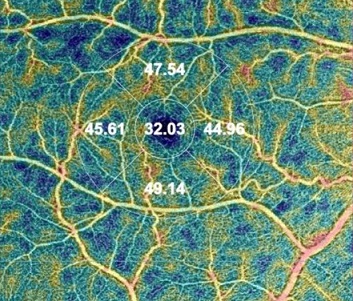BREAKING NEWS! Polish Study Finds That SARS-CoV-2 Infections Can Lead To Changes In Retinal And Choroidal Blood Vessels Of The Eyes!
COVID-19-News - SARS-CoV-2 Changes Retinal & Choroidal Blood Vessels In Eyes May 31, 2023 2 years, 8 months, 3 weeks, 3 days, 16 hours, 25 minutes ago
COVID-19 News: The COVID-19 pandemic has caused significant health concerns worldwide, affecting various organs in the body. Recent studies and
COVID-19 News reports have revealed that the virus can also have ophthalmic implications, leading to changes in the blood vessels of the retina and choroid. In a new study review, Polish researchers have delved into the effects of COVID-19 on these vital components of the eye and stress the importance of regular ophthalmic follow-up for patients who have ‘recovered’ from SARS-CoV-2 infections.
 The image of the vessel density (VD) map in the right eye was assessed
The image of the vessel density (VD) map in the right eye was assessed
automatically by optical coherence tomography angiography (OCTA) using
the early treatment diabetic retinopathy (ETDRS) grid situated in the fovea
by fixation in the superficial capillary plexus (SCP). The automatic map of
central VD is divided into four areas: the foveal VD (F VD = 32.03%), the
superior area (S VD = 47.54%), the inferior VD (I VD = 49.14%), the
temporal VD (T VD = 45.61), and the nasal VD (N VD = 44,96%).
The Extensive Impact of COVID-19
COVID-19 is known to cause a range of symptoms, from mild to severe, affecting not only the respiratory system but also other organs. Long-term consequences, referred to as post-COVID-19 syndrome, can include sensory, neurologic, cardiorespiratory, and mental health issues. Additionally, the virus can lead to ophthalmic complications such as conjunctivitis, retinovascular disease, uveitis, optic neuropathies, and orbital fungal co-infections.
How the Virus Interacts with the Eye
SARS-CoV-2, the virus responsible for COVID-19, can directly interact with angiotensin-converting enzyme 2 (ACE2), which serves as a cellular entry receptor. ACE2 is found in various cells, including those in the eye's retina and choroid. Furthermore, the virus can also utilize neuropilin 1, involved in ocular angiogenesis, potentially leading to adverse effects on retinal and choroidal vasculature.
Optical Coherence Tomography Angiography (OCTA)
OCTA is a non-invasive imaging technique that allows the evaluation of retinal and choroidal microvasculature. It measures parameters such as vessel density (VD) and foveal avascular zone (FAZ). Through OCTA, the Polish study team has assessed the vascular changes in COVID-19 patients and found reduced vascular density and an increased foveal avascular zone, which can persist for several months after infection.
Retinal Ischemia and COVID-19
The retina relies on a healthy vascular supply for proper functioning. Studies have detected SARS-CoV-2 viral particles in retinal biopsies and observed abnormalities in retinal and choroidal vasculature in COVID-19 patients. Symptoms like cotton wool spots, microhemorrhages, and retinal vein occlusions have been reported, likely caused by direct viral tissue injury, endothelial damage, and inflammatory responses.
Reduced Vessel Density in COVID-19 Pati
ents
Various studies using OCTA have shown reduced vessel density in the superficial and deep capillary plexus of the retina among patients with acute and recovered COVID-19. These changes in vessel density can be attributed to the direct effects of the virus and the systemic inflammation it triggers. The severity of the infection and the timing of eye examinations may also influence the observed differences.
Conclusion
COVID-19 can have long-lasting effects on the retinal and choroidal blood vessels, leading to reduced vascular density and alterations in the foveal avascular zone. Regular ophthalmic follow-up with OCTA is crucial for assessing the impact of inflammation and systemic hypoxia in COVID-19 patients. Further research is needed to understand the varying risks associated with different viral variants and the effects on retinal and choroidal vascularization.
The study findings were published in the peer-reviewed Journal of Personalized Medicine.
https://www.mdpi.com/2075-4426/13/6/926
For the latest
COVID-19 News, keep on logging to Thailand Medical News.
